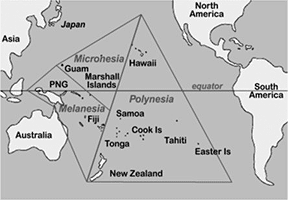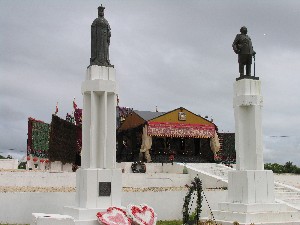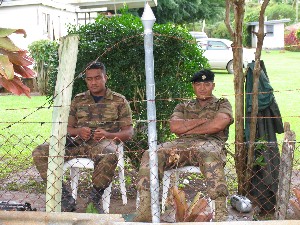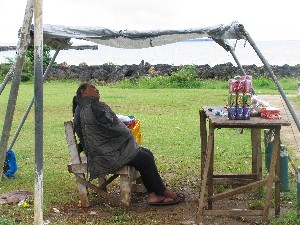The Kingdom of Tonga and the Fight Against Feudalism in the Pacific Islands
By Andre Vltchek
In the first week of May 2007, the Kingdom of Tonga was getting ready for a lavish wedding. Seventh in line for the royal throne, Fanetupouvava’u Tuita, 29, was to marry Kiu Kaho, an army lieutenant whose father is a noble, Tu’ivakano, and is a cousin of the royal family. Tuita is the second daughter of the controversial millionaire princess Pilolevu Tuita who runs Tongasat, a satellite communications company out of Hong Kong.
The princess’s older brother is King George Tupou V, who acceded to the throne in 2006. Discussion in the press and on the streets centered on the magnificent 18-karat engagement ring surrounded by diamonds. But some Tongan citizens are asking whether this is the way to spend money in a country that is on the brink of financial ruin.
Tonga, an archipelago in the southern Pacific that became a member of the British Commonwealth in 1970, is broke and troubled. In November 2006, frustrated crowds predominately consisting of unemployed youth destroyed most of the downtown area of the capital, Nuku’alofa. At least six lives were lost in the flames of ransacked stores. Some of the rioters were former members of California-based Polynesian gangs deported from the United States. Others were allegedly fighting for democracy, against one of the world’s most oppressive feudal systems. But the opposition has not yet come up with a coherent plan to fight monarchy and feudalism.

Island groups in Tonga. Nuku’alofa is
in the Tongatapu group.
Mr. Faleata, who runs a small travel-related business on Vava’u Islands (400 miles from the capital), doesn’t believe that the changes will arrive through peaceful means: “The entire system, but especially the nobility, is taking advantage of our people. When the rich decide to throw a huge party or to arrange a wedding, poor people have to supply them with food and gifts. What do the poor get in exchange? Nothing. It is a system of submission and exploitation. Last November we had no riots here in Vava’u. But almost all of our people support the pro-democracy movement. If no changes come soon, the entire country [could] experience violence on a much larger scale than last year.”
At the tiny airport of Vava’u, an agent of Airlines Tonga openly insults passengers, both locals and foreigners. She bumps confirmed passengers off the overbooked flight and calls the guard to take away anyone who dares to protest. No compensation is offered, no apology given. “She can do anything she wants,” one of the locals explains. “She is a daughter-in-law of the People’s Representative from Vava’u. Nobody would dare to suggest that she should be fired.”
Back in Nuku’alofa, a member of the “pro-democracy” movement, Mr. Hapu Mafi, explains his view: “This government doesn’t know what to do. The fact that it is now hiring so many foreign advisors shows that it has no idea how to solve the problems. The majority of our people support the pro-democracy movement, but the PM and ministers are defending the status quo.”
“The system which we have now was relevant in the past, but every society needs to evolve. In Tonga, we grew up in a system where it was hammered into our brains that the nobles will take care of society. It worked fine in the subsistence economy, but not in one ruled by the market. These days, nobles do nothing; they just sit in their compounds and take advantage of the majority of our people. We don’t want to fully dismantle the monarchy, but even our king should be accountable to the people. The same with the budget: Tongan people are taxed and they are told that to pay taxes is their duty, but the government should also be accountable to the people and be transparent about how the money is being spent.
“The Pro-democracy movement is also very dissatisfied with the religious leaders, who seem to be all too willing to extract funds from families, no matter how poor their members are. Our people are suffering. Inflation is high. The standard of living of Tongans is declining. We don’t want to ignite the riots. We want to live peacefully. But there has to be some solution to the present problems. And patience is running out.”
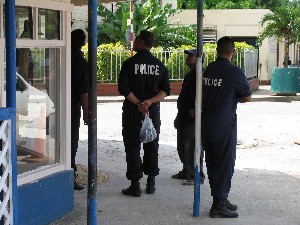
Police guard a corner in Nuku’alofa
The mood on the streets of the capital is tense. Groups of unemployed youth are aimlessly gathering at major intersections. Most downtown shops were leveled to the ground, as was the only multi-screen cinema in the country.
Tourism collapsed almost entirely. The Tongan National Center and National Museum stand almost empty; the miniscule expatriate community, consisting mainly of foreign advisers and relief workers, can be seen in the few surviving cafes.
The park surrounding the War Memorial has been taken over by the Tongan military to protect one of the royal palaces, despite the fact that the king abandoned the ancient palace in the center of the city, moving to a lavish new California-style mansion at the outskirts. With less than 100,000 inhabitants, the Kingdom of Tonga has more than 700 soldiers. Facing no known international disputes, their primary role is to pacify the population. But Tonga also sent 40 troops to join the “Coalition of the Willing,” supporting the U.S. invasion of Iraq in 2004. Another 800 soldiers are scheduled to be hired this year. The Minister of Education was overheard joking that his country is hiring more soldiers than teachers.
The situation in Tonga is indeed bleak. Unemployment is high and so is inflation. The country has virtually ceased to produce, depending instead for its survival on remittances and foreign aid. More Tongans now live abroad than in the Kingdom itself (not an unusual situation in Pacific islands). Their remittances are a major source of income in the islands. Poverty is omnipresent in both the capital city and the countryside. And the press is tightly controlled with criticism of the monarchy taboo.
The Economist visited Tonga in March 2007 and offered a cautiously optimistic assessment:
After a century of royal rule, in which the monarchy defended its power with claims that government by the masses would prove “corrupt”, political leaders are coming around to the view that more democracy is the best way to check mismanagement and improve Tongans’ living standards. Until recently, the cabinet was composed entirely of the king’s nominees, and only nine popularly elected representatives sat in the 30-member legislative assembly, alongside nine noble representatives and 12 members appointed by the king.
The royal government squandered money on misguided aviation and shipping ventures, and the bulk of the $56m it secured from selling passports was frittered away in poor investments by a visiting American rogue rather quaintly appointed by the king as his “court jester”. That the royal family also benefited from big private-sector investments—including ownership of the mobile-phone industry, cable television, a brewery and the electricity utility—increased public disquiet. The monarchy responded with a pragmatic reform programme that began before the accession of King George Tupou V to the throne in September 2006. Elected members of parliament were allowed to enter the cabinet, and for the first time in a century a “commoner”, Fred Sevele, became prime minister.
But Fred Sevele is widely believed to be linked to the royal family by common financial interests. The recent reforms have brought few gains to the majority of Tongan citizens. Disappointment with local elites is growing, and tension is palpable in the streets.
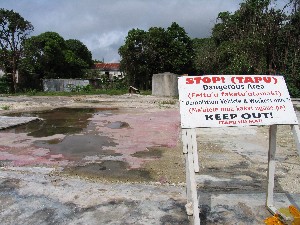
Sign erected after November 2006 riots
A small but influential Tongan intellectual group has expressed disappointment with both the ruling class and the so-called pro-democracy movement. One of them is Ms. Kulala Unu, principal of Tonga High School, an elite institution with 1,400 students that has educated both government officials and leaders of the “pro-democracy movement.”
“I would like to see much more civic education in my country,” Unu explained. “I would like our people to understand what democracy is and what they want to achieve. Unfortunately, what we saw in November 2006 were just riots. And I hate to say it, but they were mostly ignited by racism. 80% of the downtown area was destroyed, but the original targets were Chinese businesses. This country is receiving substantial help from the People’s Republic of China. Even this school was built with Chinese funds. Several Chinese lecturers are teaching here. But there is envy towards hardworking Chinese immigrants. Right after the riots there was talk that several local businessmen paid young kids money to destroy Chinese shops.”
Whatever the reasons, one of the last feudal strongholds on earth is shaking, its walls crumbling. Tongans have begun to understand that elites are hiding the facts about their exploitation behind slogans like “tradition and culture.” If Tongans win their fight for genuine democracy, other impoverished Pacific island mini-states in the region, including Samoa, could follow.
But first of all, members of the Tongan opposition will have to clarify their own goals. There is no doubt that Tongan elites are corrupt and that the nobility has long exploited the great majority of Tongans. But what kind of society does the opposition want to build? In Tonga, there is no talk as yet about “social justice” and “equality.” The question of a secular state has yet to be raised. Yet it often feels that these words are almost on the tip of the tongue of many Tongans, and that it is just a matter of time before they are pronounced and implemented.
Andre Vltchek is a novelist, filmmaker, playwright and journalist. Editorial director of Asiana Press Agency, he is co-founder of Mainstay Press, a publishing house for political fiction. He is presently living in Southeast Asia and the South Pacific and can be reached at [email protected].
Posted at Japan Focus on May 29, 2007.
See also “The New Pacific Wall: The U.S., Australia, and New Zealand Isolate and Divide Small Insular Nations,” as well as other articles by Vltchek at Japan Focus.



